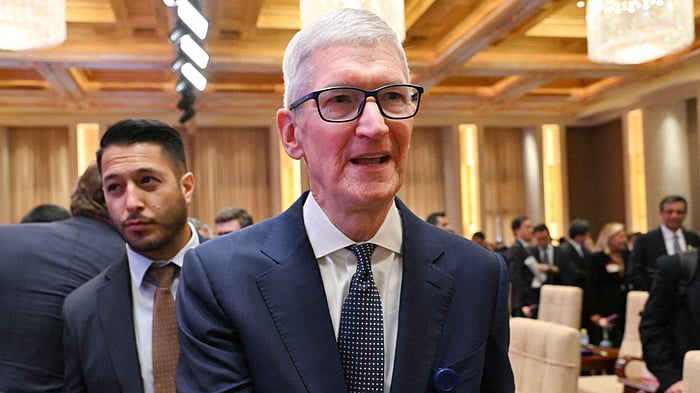When Apple CEO Tim Cook landed in China this week, it wasn’t just another routine visit to one of the company’s biggest markets. His trip to Hangzhou—the country’s emerging AI hub—came with an unmistakable signal: Apple is watching DeepSeek.
At Zhejiang University, where Apple announced a 30 million yuan ($4.1 million) donation, Cook met with young developers and praised the rapid advancements in artificial intelligence (AI) coming out of China. On the sidelines of the China Development Forum in Beijing, he singled out DeepSeek’s AI models as “excellent.” It was a rare, overt acknowledgment from the leader of a company that has largely trailed its American peers in the AI race. And it hinted at a growing realization: Apple may need DeepSeek more than it cares to admit.
The Apple Intelligence Crisis
Apple is facing a self-inflicted AI crisis. After making grand announcements about Apple Intelligence at WWDC 2024, the company has been unable to deliver. Its much-touted Siri overhaul, which promised onscreen awareness and deeper context understanding, is now delayed indefinitely. Bloomberg’s Mark Gurman recently reported that Apple executives privately admitted to having only a mock-up of the feature at launch. Inside Apple, the mood has been described as “embarrassed” and “burned out.”
The situation has left Apple scrambling. Unlike OpenAI, Google, and even Meta, Apple lacks its own groundbreaking AI models. Its LLMs (large language models) remain underdeveloped, and instead of leading the charge, it has been forced to integrate ChatGPT into its products—effectively admitting it can’t compete on its own. Now, Apple is negotiating to bring Google Gemini into its ecosystem, but no agreement has been reached. Meanwhile, its AI-powered Siri updates remain vapourware.
All these developments beg one big question: how did Apple, a company with a long legacy of being at the forefront of cutting-edge technology, and even anticipating them, fall behind? Or is it a correct way to understand the story?
Talking to Fortune India, Tarun Pathak, Research Director at Counterpoint Research, is of the opinion that the picture is far more complicated than it appears. “AI today is such a field where every entity, every company has its own journey, and one cannot say that one is better than the other. Apple’s journey is unique to itself as it relies on making AI more personalised,” he says.
But then what explains Apple’s sudden overtures towards China and DeepSeek? Pathak does not read much into it, but does concur that Apple, essentially, is keenly looking at China.
DeepSeek: The Disruptor Apple Can’t Ignore
DeepSeek, the Chinese AI company, has quietly become a global disruptor. Unlike OpenAI and Google, which rely on vast computational resources, DeepSeek shocked the AI world recently by developing models that rival Western LLMs at a fraction of the cost. This efficiency sent shockwaves through the industry, forcing OpenAI and others to rethink their own expensive, GPU-hungry architectures.
Experts do feel that DeepSeek’s ability to achieve high performance with minimal resources is precisely what Apple needs. The Cupertino giant has built its reputation on hardware optimization and efficiency. Yet, when it comes to AI, it has been forced to rely on cloud-based processing rather than local, on-device intelligence—something its privacy-conscious brand would prefer to avoid, a point Pathak also underscores.
DeepSeek’s cost-effective AI models could help Apple bridge that gap, enabling it to bring powerful AI experiences to iPhones, iPads, and Macs without excessive reliance on cloud computing.
But there is a big caveat. Pathak explains that, in essence, both DeepSeek and Apple have two very different journey. “While Apple is personalised, DeepSeek is not, it is open source. So, to integrate this technology into Apple’s products, would require an entirely new and different approach for Apple. Does the company want to walk down that road? We don’t know yet, but if it does, it will be a very big deal,” he explains.
The China Factor
The bigger challenge is geopolitics. While Apple has forged a deal with Alibaba to bring Apple Intelligence to China, Beijing’s strict data regulations mean Apple must work with local partners to ensure compliance. Alibaba is set to censor and filter AI output, while Baidu will power Apple’s Visual Intelligence and search-related AI features. But DeepSeek remains conspicuously absent from the initial rollout.
Given Cook’s public praise, Apple could be laying the groundwork for a future partnership. DeepSeek’s efficiency aligns with Apple’s hardware-driven philosophy, and integrating its technology could allow Apple to regain AI credibility without deepening its reliance on American firms like OpenAI and Google. Yet, any collaboration would have to navigate the delicate balance of US-China tech tensions, particularly as Washington continues to clamp down on Chinese AI advancements.
Apple’s Next Move
As Cook wraps up his China visit, the message is clear: Apple is at a crossroads. It can continue playing catch-up in AI, relying on external partners to power its intelligence features. Or it can recognize the disruptive potential of DeepSeek and leverage its technology to make Apple Intelligence something more than just a branding exercise.
The AI race is no longer about who has the biggest data centres or the most powerful GPUs. It’s about efficiency, adaptability, and integration—three things Apple has historically excelled at.
If Cook’s visit to Hangzhou is any indication, Apple may finally be coming to terms with the fact that DeepSeek holds the key to its AI future. But the last ink on the issue has not been spilt yet.
Source:https://www.fortuneindia.com/technology/apples-ai-crisis-is-tim-cook-turning-to-chinas-deepseek-to-salvage-apple-intelligence/121448

